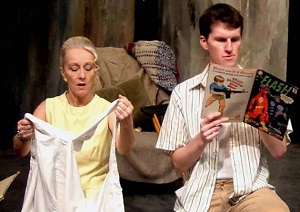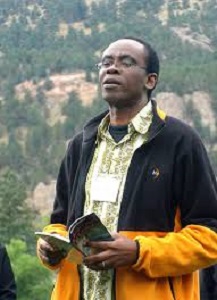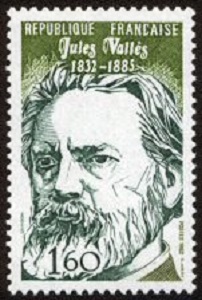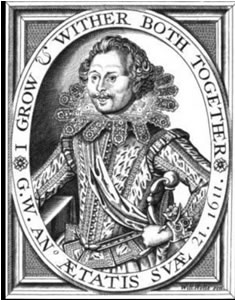De Zuidafrikaanse schrijver Harold Athol Lannigan Fugard werd geboren op 11 juni 1932 in Middelburg, Kaapprovincie. Zie ook alle tags voor Athol Fugard op dit blog.
Uit: Hello And Goodbye
““OHNNIE. What did you want to do?
HESTER. Nothing. [Loo/ting a! the certificate in her hand.] Johannes Cornelius Smit-Anna Van Rooyen. Biggest mistake she ever made!
JOHNNIE. You don’t know what you’re saying.
HESTrER. Yes, I do! I’m saying this was the biggest mistake she ever made. Marriage! One man’s slave all your life, slog away until you’re in your grave. For what? Happiness in Heaven? I seen them- Ma and the others like her, with more kids than they can count, and no money; bruises every pay-
day because he comes home drunk or anOIher one in the belly because he was so drunk he didn’t know it was his old wife and got into bed!
JOHNNIE. Daddy never beat Mommie. He was never drunk.
HESTER. Because he couldn’t. He was a crock. But he did it other ways. She fell into her grave the way they all do- tired, maeg. Frightened! I saw her.
JOHNNIE. This is terrible, Hester.
HESTER. You’re damned right it is. It’s hell. They live in hell, but they’re too frightened to do anything about it because there’s always somebody around shouting God and Judgement. Mommie should have taken what she wanted and then
kicked him out.
JOHNNlE. And the children.
HESTER. So what! If you get them you get them and if you don’t want them there’s ways.
JOHNNlE. Hester! Hester!
HESTER. Hester, Hester what? Hester who? Hester Smit! That‘s me. I’ve done it. And I don‘t care a damn. Two months old and I got rid of it.”

Athol Fugard (Middelburg (ZA), 11 juni 1932)
Scene uit een opvoering in het Abbey Theatre, St Albans, 2011
De Nigeriaanse dichter, schrijver, architect, en milieuactivist Nnimmo Bassey werd geboren in Akwa Ibom op 11 juni 1958. Zie ook alle tags voor Nnimmo Bassey op dit blog.
Uit:To cook a continent
“There are some in Africa who argue that having a valuable resource is not necessarily a curse. They say that nature’s wealth is a blessing and that the curse happens only in relation to how resources are grabbed, owned, extracted and utilised. In other words, the curse is located firmly in the social structure of the world.
Let us start with a caveat about the word ‘resource’, which implies that nature’s wealth is a bounty, ready for corporate robbery. But we as humans frame this dilemma of extraction incorrectly if we don’t point out the intrinsic right of nature to survive on its own terms. Most importantly, we are part of Mother Earth, not apart from her. Her rights to exist and reproduce the conditions for all species’ existence are not to be violated.
That said, everyone acknowledges that Africa is resource rich. That the continent has been a net supplier of energy and raw materials to the North is not in doubt. That the climate crisis confronting the world today is mainly rooted in the wealthy economies’ abuse of fossil fuels, indigenous forests and global commercial agriculture is not in doubt. What has been obfuscated is how to respond to this reality. Indeed, the question peddled in policy circles is often what can be done about Africa. And, in moments of generosity, the question moves to what can be done for Africa.“
This book looks at what has been done to Africa and how Africans and peoples of the world should respond for the collective good of all. The resource conflicts in Africa have been orchestrated by a history of greed and rapacious consumption. We ask the question: must these conflicts remain intractable? We will connect the drive for mindless extraction to the tightening noose of odious debt repayment and we will demand a fresh look at the accounting books, asking when environmental costs and other externalities are included: who really owes what to whom? Isn’t Africa the creditor of the world, if we take seriously the North’s ‘ecological debt’ to the South?”

Nnimmo Bassey (Akwa Ibom, 11 juni 1958)
De Franse schrijver Jules Vallès werd geboren op 11 juni 1832 in Puy-en-Velay, Haute-Loire. Zie ook alle tags voor Jules Vallès op dit blog.
Uit: L’Enfant
« La maison que nous habitons est dans une rue sale, pénible à gravir, du haut de laquelle on embrasse tout le pays, mais où les voitures ne passent pas. Il n’y a que les charrettes de bois qui y arrivent, traînées par des boeufs qu’on pique avec un aiguillon. Ils vont, le cou tendu, le pied glissant; leur langue pend et leur peau fume. Je m’arrête toujours à les voir, quand ils portent des fagots et de la farine chez le boulanger qui est à mi-côte; je regarde en même temps les mitrons tout blancs et le grand four tout rouge, – on enfourne avec de grandes pelles, et ça sent la croûte et la braise!
La prison est au bout de la rue, et les gendarmes conduisent souvent des prisonniers qui ont les menottes, et qui marchent sans regarder ni à droite ni à gauche, l’oeil fixe, l’air malade.
Des femmes leur donnent des sous qu’ils serrent dans leurs mains en inclinant la tête pour remercier.
Ils n’ont pas du tout l’air méchant.
Un jour on en a emmené un sur une civière, avec un drap blanc qui le couvrait tout entier; il s’était mis le poignet sous une scie, après avoir volé; il avait coulé tant de sang qu’on croyait qu’il allait mourir.
Le geôlier, en sa qualité de voisin, est un ami de la maison; il vient de temps en temps manger la soupe chez les gens d’en bas, et nous sommes camarades, son fils et moi. Il m’emmène quelquefois à la prison, parce que c’est plus gai. C’est plein d’arbres; on joue, on rit, et il y en a un, tout vieux, qui vient du bagne et qui fait des cathédrales avec des bouchons et des coquilles de noix.
À la maison, l’on ne rit jamais; ma mère bougonne toujours. – Oh! comme je m’amuse davantage avec ce vieux là et le grand qu’on appelle le braconnier, qui a tué le gendarme à la foire du Vivarais!.”

Jules Vallès (11 juni 1832 – 14 februari 1885)
De Engelse dichter en satiricus George Wither werd geboren op 11 juni 1588 in Bentworth. Zie ook alle tags voor George Wither op dit blog.
Shall I Wasting In Despair
Shall I wasting in despair
Die because a woman’s fair?
Or make pale my cheeks with care
‘Cause another’s rosy are?
Be she fairer than the day,
Or the flow’ry meads in May,
If she be not so to me,
What care I how fair she be?
Shall my heart be griev’d or pin’d
‘Cause I see a woman kind?
Or a well-disposed nature
Joined with a lovely feature?
Be she meeker, kinder, than
Turtle dove or pelican,
If she be not so to me,
What care I how kind she be?
Shall a woman’s virtues move
Me to perish for her love?
Or her well-deserving known
Make me quite forget mine own?
Be she with that goodness blest
Which may gain her name of best
If she be not such to me,
What care I, how good she be?
‘Cause her fortune seems too high
Shall I play the fool and die?
Those that bear a noble mind,
Where they want of riches find,
Think what with them they would
That without them dare to woo;
And unless that mind I see,
What care I how great she be?
Great, or good, or kind, or fair,
I will ne’er the more despair;
If she love me, this believe,
I will die ere she shall grieve;
If she slight me when I woo,
I can scorn and let her go;
For if she be not for me,
What care I for whom she be?

George Wither (11 juni 1588 – 2 mei 1667)
De Engelse dichter en vertaler Barnabe Googe werd geboren op 11 juni 1540 in Londen of Kent. Zie ook alle tags voor Barnabe Googe op dit blog.
Once Musing As I Sat
Once musing as I sat,
And candle burning by,
When all were hushed, I might discern
A simple silly fly,
That flew before mine eyes
With free rejoicing heart,
And here and there with wings did play,
As void of pain and smart.
Sometime by me she sat,
When she had played her fill,
And ever when she rested had,
About she flittered still.
When I perceived her well,
Rejoicing in her place,
O happy fly, quoth I, and eke
O worm in happy case,
Which two of us is best?
I that have reason? No;
But thou that reason art without
And therewith void of woe.
I live, and so dost thou,
But I live all in pain,
And subject am to her, alas,
That makes my grief her gain.
Thou livset, but feelst no grief,
No love doth thee torment;
A happy thing for me it were,
If God were so content,
That thou with pen wert placed here
And I sat in thy place,
Then I should joy, as thou dost now,
And thou shouldst wail thy case.
Barnabe Googe (11 juni 1540 – 1594)
Huis in Tudor stijl bij Scotney Castle in Kent, waar Googe onderdak bood aan Jezuïeten
